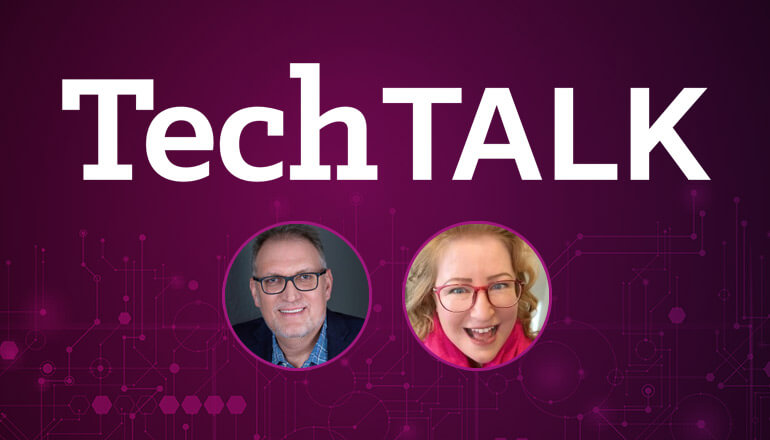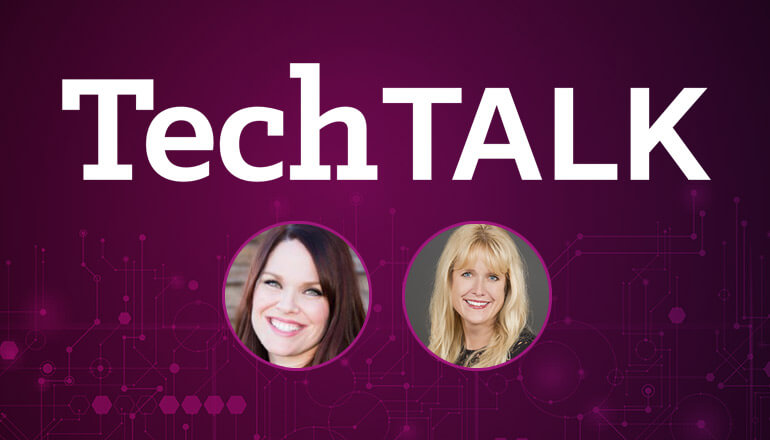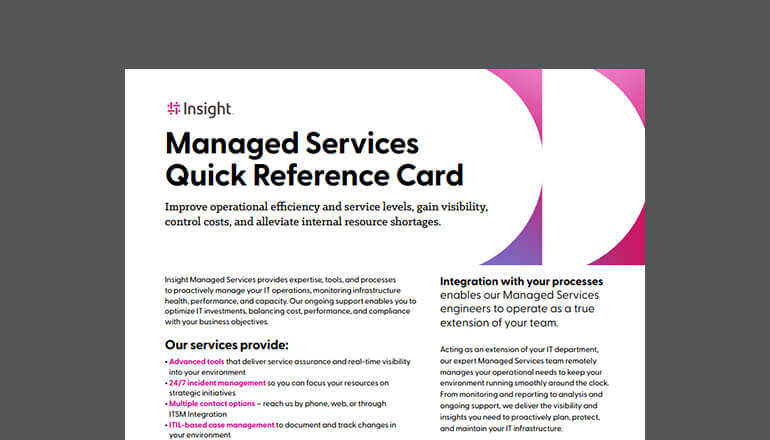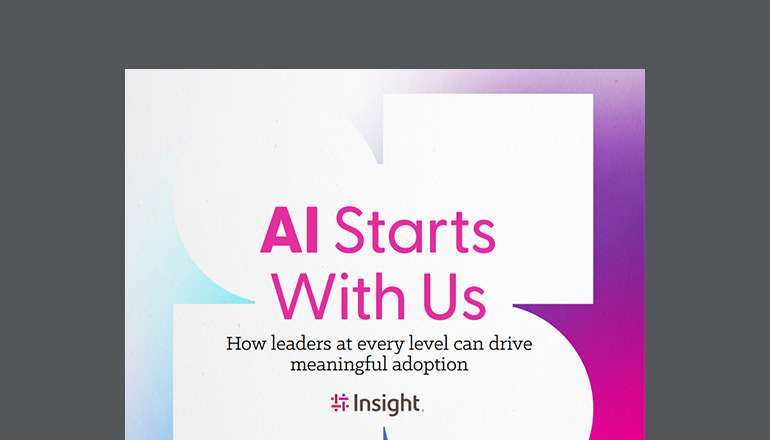Audio transcript:
A Guiding Light: Intelligently Enhance Your Database Strategy
Erin
Hello, and thank you for joining us for another Insight "Tech Talk." My name is Erin Hazen and I'm a client solutions executive here at Insight. And I'm excited to talk with all of you today about the trends that we are seeing within customer database environments and how Quest and Insight can help. It is my sincere pleasure to welcome Bharath Vasudevan, vice president of Product Management and Marketing from Quest. Welcome, Bharath.
Bharath
Well, thanks for having me, Erin.
Erin
Really excited to chat with you today. So let's set the stage a little bit. We know that there is a significant uptick in organizations being tasked with improving efficiencies in their digital environments while balancing the shifting of resources and budgets, and now more than ever, consolidating software and vendors is a priority. And today we're going to explore what Quest is seeing in the market and how you guys are addressing these needs. Does that sound good?
Bharath
Sounds about right.
Erin
Perfect. Okay, so let's start at the beginning, Bharath. Quest has a pretty broad portfolio of software. What are we going to be talking about today?
Bharath
Well, okay, so big Quest is really broken up into three primary areas that deal around identity and cybersecurity. Another area that's around active directory, monitoring migrations, and really dealing with that environment. And the third part, the one that I'm attached to, is a little bit more focused around data, infrastructure and metadata. So we're going to spend a little bit of time talking a little bit more about databases in particular within that broad spectrum.
Erin
I love it. And I know that this is a topic of great focus, especially as we mentioned, like budgets are shifting, resources are shifting, needs are shifting in the industry. So maybe tell me a little bit about your customers in this space and what's important to them.
Bharath
Well, so we we're dealing with customers of all shapes and sizes that are at any point, you know, we talked about digital transformation for about 10 years, right? Newer companies are the ones that are just cloud native. We have some traditional companies that have big on-premise states that are investigating what are the right workloads to move to the cloud. And some cases are refactoring things in the cloud, but a lot of the business critical applications, apps that companies have built are all built on databases. So now all of these organizations are looking at, what is the database I'm on? Is it going to meet my needs moving forward? Can I get some optimizations from running things in the cloud? Database as a service, you know, whether it's the lift and shift, taking exactly what's on-prem, moving it to an infrastructure as a service container in the cloud or potentially leveraging microservices in the cloud. All these decisions are being made at various points throughout all our organizations around what's the best path forward.
Erin
It's complicated, right? And a little bit like there's just so many decisions that need to be made. And I imagine, are you seeing customers getting a little bit overwhelmed with sort of the level of complexity that this can ask of them?
Bharath
Well, you know, it's not just complexity. Think of it as a big multifactor problem, right? So there is complexity on what's the right path to move down. Then you've got financial pressures that say, "Hey, by the way, while you're doing all that, you can't increase cost." In some cases it's moved from a Cap Ex spend to an Op Ex spend. And in many cases, the people that are actually making the decisions aren't really the implementers. So do I do what's best for the company? What's best for my organization? What makes my life easier? Where's the skillset? I mean, there's so many different things that range from HR to finance to just implementation issues.
Erin
And so we kind of need a guiding light. We need a Quest to be able to say, "Hey, we can help you, you know, look at all of these challenges and do a deep dive." And maybe that leads me to my next question is like, if I'm the customer, why are we coming to Quest to talk about these initiatives?
Bharath
Well, so most of our customers, right? At least the ones we talk to, land in a couple of groups, and it spans all shapes and sizes, but really it's ones that have adopted a best-in-breed database strategy. So they've kind of farmed out the decision around what databases need to get used to all their different business units, and they're able to start making decisions that benefit themselves. So we see some that are down an Oracle path, some that are on a SQL server path, some that are out a DB2, Postgres, some that have moved to SAP. And then you've got other organizations that are looking at driving efficiencies saying, "Hey, look, we're going to consolidate around a single database." And some of these might be due to financial reasons, right? We're moving from a commercially licensed database to an open-source database because we're going to lose some things we know for sure from a feature functionality standpoint, but this is really going to benefit us from a wallet standpoint moving forward and gives us a ton of flexibility to go do some of the other things that are higher priority in the business.
Erin
Right, so that is like a really valuable, like consultative piece of the Quest solution, which is exactly as you just said, sorry to reiterate. But we are going to be not only looking at your needs, we're balancing out the costs as well, so that potentially we can free up additional budget that you can use for your, you know, higher priority projects, is that right?
Bharath
For sure. And I'd say one of the other things that we try to do for a lot of our customers is help keep them out of getting locked into a particular vendor. So, you know, we throw around the term heterogeneity a lot. Really it's that ability to support multiple different database types, in some cases with the same tools or in some cases with tools that are purpose built for a particular set of databases. And it really allows a customer to get trained on one set of tools and then be able to use that across their entire database estate.
Erin
This must be a huge relief for organizations that you've helped with these kinds of challenges. Because I know even when I'm dealing with my clients, some of them have come in, and they're new to the organization, and they're dealing with legacy sort of decisions that have been made. I imagine that is something you see pretty frequently.
Bharath
Well, and, you know, as we move into what's largely considered a bear economy, you know, the reason behind moving projects forward is really, you know, is it going to make money, save money or reduce risk? And what we do here with a lot of our toolset is we're removing a lot of that risk. We're removing one of the barriers to change some of the underlying components. If they know parts of the management stack, how it's being monitored, how it's being replicated, how it's being backed up or going to be consistent.
Erin
I love that. I feel like that probably, you can hear maybe sighs of relief across the organizations in the industry when there's less less what they have to be concerned about. 'Cause we know that the decisions just never stop coming in, and the challenges never stop flowing. So if there's one thing we can take off of their plate, that sounds like a really valuable piece of the puzzle.
Bharath
No, for sure. And really what we're trying to do is we're trying to start organizing a little bit more around the database of choice. So you come to us as a Microsoft SQL Server customer, well, we can tell you everything in our portfolio that supports that database of choice. And then you get back down into some of the procurement challenges about wanting to consolidate vendors, make it easier to transact, to co-term licenses, to wrap everything up in a larger license agreement. It now starts making transacting that whole process significantly easier. And really that's what we found with a lot of our customers, is specifically working with partners like Insight that can help guide them through that entire process to be able to really understand what's important to them, bring to bear some of the technologies that you have, bring to bear some of the technologies that we have, but the whole time, we're pivoting around what's important to them.
Erin
Totally, totally. And removing those pain points because I know those are the things that cause leadership and IT, you know, organizations or the IT piece of an organization to really stress out. You know, the adage, right? What keeps you up at night? This is literally it, is how to manage all of these challenges in an efficient and cost effective way. I love that this is a solution that Quest has brought to the table, and I know that our viewers are going to be really grateful to hear and learn a little bit more about this. Is there anything in addition that you wanted to talk to about what Quest initiatives are right now?
Bharath
Well, so really from us, right? So I lead product management for this entire business unit. And really for us, there's six things that we really focus on when looking how best to interface with large clients, small clients, it really doesn't matter, but these are our investment areas, right? And we already touched on this heterogeneous platform support because we're trying to prevent any of our customers from getting locked into a particular vendor. But we're always enhancing the user experience. We're looking at ways, because everyone's tightening their belts, how can we embrace automation and orchestration or provide intelligent recommendations? We've got a lot of cloudification efforts underway so that if you want to just get stuff out of your data center we've gotten a way to give you that same experience that you're used to, but without the management overhead, with just being able to put it in an AWS or an Azure. But one of the most interesting things that we're working on right now, and this is pen portfolio. So in addition to database solutions, infrastructure, everything else is really around cybersecurity hardening. So we know what's very, very important to a lot of our customers is we don't want to be their supply chain risk. So we're going through third-party pen testing, software development lifecycle, best practices. We've even got some products that we're pushing through the fed-ready standpoint for the public customers.
Erin
Oh, great.
Bharath
So, you know, that's become very central to a lot of our roadmaps, and we've got products that do use third-party products, and we have, when vulnerabilities get discovered, we have to go fix them, but understand that when we're choosing partners to work with, that's really one of our top priorities because the trust that we've built over the years with our customers is things that we don't take lightly.
Erin
Totally, totally. And I really appreciate you mentioning that because we do have a strong relationship with Quest, and Insight and Quest are terrific partners that I think with this comprehensive sort of stack of solutions that Quest can offer with Insight support, we can really address some challenges the customers are facing. Thank you so much for your insights today, Bharath. It's been an exceptional learning opportunity for our viewers, and we really appreciate your time.
Bharath
Well, Erin, I thank you very much for the opportunity to come, just share a little bit of time we've got today with you guys and your customers.
Erin
Yeah, it's been great. And of course, if you would like to learn more about Quest and the solutions that they can offer, you can visit the Quest partner page on insight.com, and we'll drop in a link in the show notes so that you can easily find that information. And while you're there, we would love it if you would have a look at our tech journal and subscribe to that tech journal because it is a resource that is available to all of you for free where you can find inspiration and insights into the future of business and technology. So make sure you go and visit both of those pages on insight.com. It has been a sincere pleasure chatting with you, Bharath, and on behalf of Insight, thank you for all of your time today. We look forward to tech talking again with you very soon.










